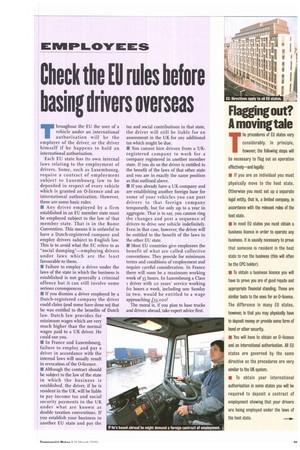Check the EU rules before basing drivers overseas
Page 27

If you've noticed an error in this article please click here to report it so we can fix it.
Throughout the EU the user of a vehicle under an international authorisation will be the employer of the driver, or the driver himself if he happens to hold an international authorisation.
Each EU state has its own internal laws relating to the employment of drivers. Some, such as Luxembourg, require a contract of employment subject to Luxembourg law to be deposited in respect of every vehicle which is granted an 0-licence and an international authorisation. However, there are some basic rules.
• Any driver employed by a firm established in an EU member state must be employed subject to the law of that member state. That is in the Rome Convention. This means it is unlawful to have a Dutch-registered company and employ drivers subject to English law. This is to avoid what the EC refers to as "social dumping"—employing drivers under laws which are the least favourable to them.
• Failure to employ a driver under the laws of the state in which the business is established is not generally a criminal offence but it can still involve some serious consequences.
• In France and Luxembourg, failure to employ and pay a driver in accordance with the internal laws will usually result in revocation of the 0-licence.
• Although the contract should be subject to the law of the state in which the business is established, the driver, if he is resident in the UK, will be liable to pay income tax and social security payments in the UK under what are known as double taxation conventions. If you establish your business in another EU state and pay the tax and social contributions in that state, the driver will still be liable for an assessment in the UK for any additional tax which might be due.
• You cannot hire drivers from a UKregistered company to work for a company registered in another member state. If you do so the driver is entitled to the benefit of the laws of that other state and you are in exactly the same position as that outlined above.
• If you already have a UK company and are establishing another foreign base for some of your vehicles you can post drivers to that foreign company temporarily, but for only up to a year in aggregate. That is to say, you cannot ring the changes and post a sequence of drivers to drive one vehicle indefinitely. Even in that case, however, the driver will be entitled to the benefit of the laws in the other EU state.
• Most EU countries give employees the benefit of what are called collective conventions. They provide for minimum terms and conditions of employment and require careful consideration. In France there will soon be a maximum working week of 35 hours. In Luxembourg a Class driver with zo years' service working 6o hours a week, including one Sunday in two, would be entitled to a wage approaching £35,0 oo !
The moral is, if you plan to base trucks and drivers abroad, take expert advice first,








































































































